Learn Drywall Installation for Commercial Construction
How you can learn how to drywall to launch a well-paid, versatile construction career.
Drywalling is a crucial component of the commercial construction industry. It involves creating interior walls and ceilings that are smooth, fire-resistant, and durable. This process consists of several steps:
A day in the life of a professional drywaller involves numerous tasks aimed at ensuring that the drywall is perfectly installed and finished. Here are some common daily duties:
Starting a career in drywalling offers numerous opportunities for advancement.
Here’s a typical career progression along with estimated pay ranges in Michigan:

Clark Causley is a is a project manager at Lakewood Construction and WMCI instructor.
What drywall so valuable is that it’s a foundational skill for nearly every other craft trade in commercial construction. When you learn how to drywall, you’ve basically learned 2/3 of the basics needed for carpentry, electrical, plumbing, exterior envelope, etc.
And in the merit shop setup where you have more freedom to shape your own construction career path, this foundation allows you to choose one that best fits your interests and then move up faster.
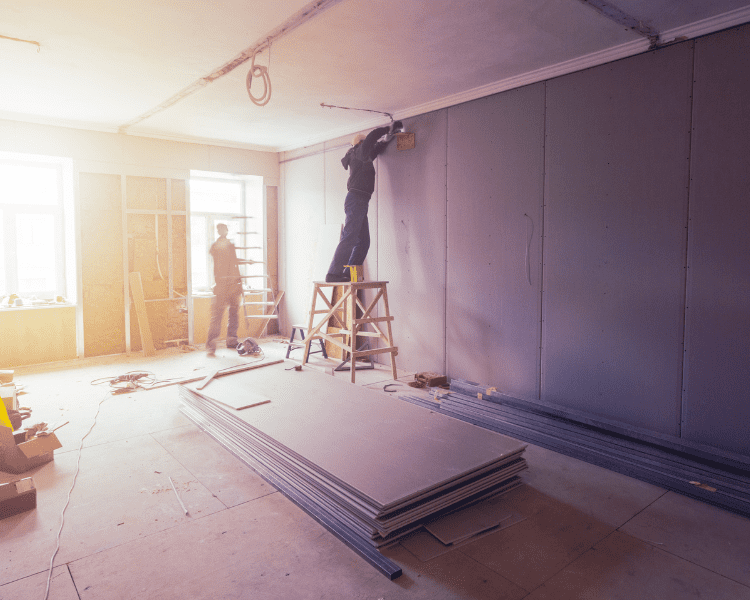

Drywall plays a crucial role in fire suppression and protection.Years ago, before drywall became popular, builders often used materials like plaster and wood to finish walls. Wood, as you might imagine, is highly flammable, and plaster, though better, still didn’t provide the level of protection needed for fire safety.
Drywall on the other hand, was a game-changer for fire-resistant properties because its core material is gypsum – a natural mineral that contains water in its structure. When gypsum is exposed to fire, this water is released as steam, which slows down the transfer of heat and helps prevent the spread of flames making drywall an invaluable barrier against fire.
Commonly, standard drywall can resist fire for approximately 30 minutes and specialized fire-rated drywall can last for an hour or more. To put that into perspective, studies show that using fire-rated drywall in commercial construction can reduce the risk of fire spread by up to 75% compared to traditional materials!
Drywall is so useful and so universal in construction that the opportunities to build structures you dream up is near limitless! As you can imagine, this opens a lot of doors to what you can do not just at work, but on your own time as well.
For example, I wanted to free up some space in our living room by creating a little TV area. I framed it with 1-5/8″ steel studs, drywalled, finished, primed, painted and – BOOM – done! It was a very inexpensive way to dress up this space and the family loves it.
Side note: As you can imagine, you’ll quickly find that you become in high-demand with your friends and family. 🙂
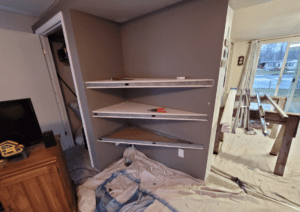
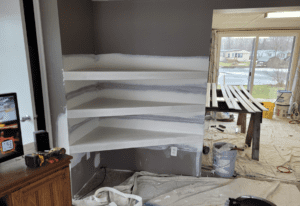
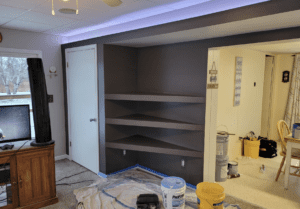
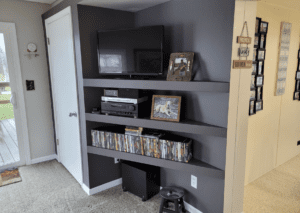
If you are interested in starting a career in commercial construction, drywall is a great option. Not only is it well-paid and in high-demand, it’s a skill that opens doors to grow into a wide range of craft trades of your choosing.
The West Michigan Construction Institute first opened its Drywall I Training in the Fall of 2024. In addition to receiving their NCCER Drywall I Certification, students in this course also graduate with their NCCER CORE: Foundational Construction Skills Certification!
Learn more about this popular program below and make sure you join the course mailing list to be the first to know when enrollment opens.
More from the blog:
How you can learn how to drywall to launch a well-paid, versatile construction career.
Hear the hard hat story of WMCI graduate Billie Beresford and how WMCI's Carpentry I program and launched their construction career at First Cut Millwork!
The Fall '24 newsletter shares updates on enrollment, our team & students, and more as West Michigan Construction Institute enters its third year!